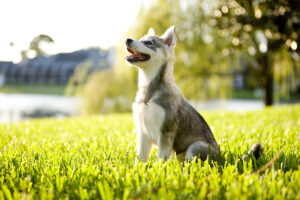
Keeping your new puppy from chewing on things they shouldn’t is a difficult task. Take some important steps to keep them, and your belongings, safe.
Bringing home a new puppy is an exciting and heartwarming experience. However, with their insatiable curiosity and boundless energy, puppies often find solace in exploring the world through their mouths. While this is a natural behavior, it can lead to destructive consequences when they choose inappropriate objects to chew on. To maintain a harmonious household and ensure your furry friend’s safety, here are some valuable tips on how to keep puppies from chewing on things they shouldn’t.
Puppy-proof Your Home
Prevention is better than a cure, and the first step to curb inappropriate chewing is by making your home puppy-proof. Puppies are drawn to objects that smell interesting or look appealing, so keep items like shoes, cables, remote controls, and small household items out of reach. Use baby gates to limit access to certain areas and supervise your puppy when they’re exploring new spaces.
Provide Suitable Chew Toys
To redirect your puppy’s chewing instincts, offer a variety of appropriate chew toys. Toys that are specifically designed for teething puppies or made of durable materials can satisfy their urge to chew and keep them entertained. Rotate the toys regularly to keep their interest piqued.
For teething puppies, a toy with food inside of it that has been frozen is a great option. The cold can help soothe their sore mouth, and the food is a tantalizing treat they’ll be determined to get at.
Encourage Positive Associations
Create positive associations with their toys by introducing treats or using interactive toys with hidden treats. This will help your puppy associate their toys with rewards, making them more likely to choose their toys over inappropriate objects.
Consistent Training & Redirection
Training plays a crucial role in modifying your puppy’s behavior. Whenever you catch them chewing on something inappropriate, calmly redirect their attention to an acceptable chew toy. Praise and reward them when they choose the correct item. Avoid scolding or punishing, as this might confuse or frighten the puppy.
Use Deterrents
Deterrents can be valuable tools to dissuade puppies from chewing on certain objects. Bitter-tasting sprays or pet-safe deterrent products can be applied to items you want to protect. The unpleasant taste will discourage your puppy from revisiting those objects.
Regular Exercise & Mental Stimulation
Puppies often chew out of boredom or excess energy. Ensure your puppy gets enough physical exercise and mental stimulation through playtime, walks, and training sessions. A tired puppy is less likely to engage in destructive behaviors.
Enroll in Puppy Training Classes
Professional puppy training classes not only help with basic obedience but also teach you effective methods to control and redirect your puppy’s chewing habits. Socialization with other dogs and people can also aid in behavioral development.
Use Confinement When Necessary
Consider using a crate or a safe, puppy-proofed room when you can’t supervise your puppy. This not only prevents inappropriate chewing but also keeps your puppy safe from potential hazards. Crate training can be difficult at first, but it provides long-term benefits for both you and your pup.
Seek Veterinary Advice
If your puppy’s chewing behavior seems excessive or becomes a cause for concern, consult your veterinarian. Chewing can be a symptom of dental issues or other health problems, so a vet check-up can help rule out any underlying medical conditions.
Trust Maryland Veterinary Surgical Services With Your Companion’s Health
Your companion’s health is important, and the team at MVSS is ready to provide the best care possible for your furry family. We are dedicated to combining comprehensive exams and assessments with informative and honest discussions of your companion’s care. Once we have worked with you to decide on the best course of action for your dog, our professionals will use their surgical expertise to work towards the goal of giving your companion an active and pain-free life. We are proud to serve loyal companions in Catonsville and Baltimore. To learn more about our services, give us a call at 410-788-4088 or visit us online. For more information and tips for pet health, follow us on Facebook and Pinterest.
